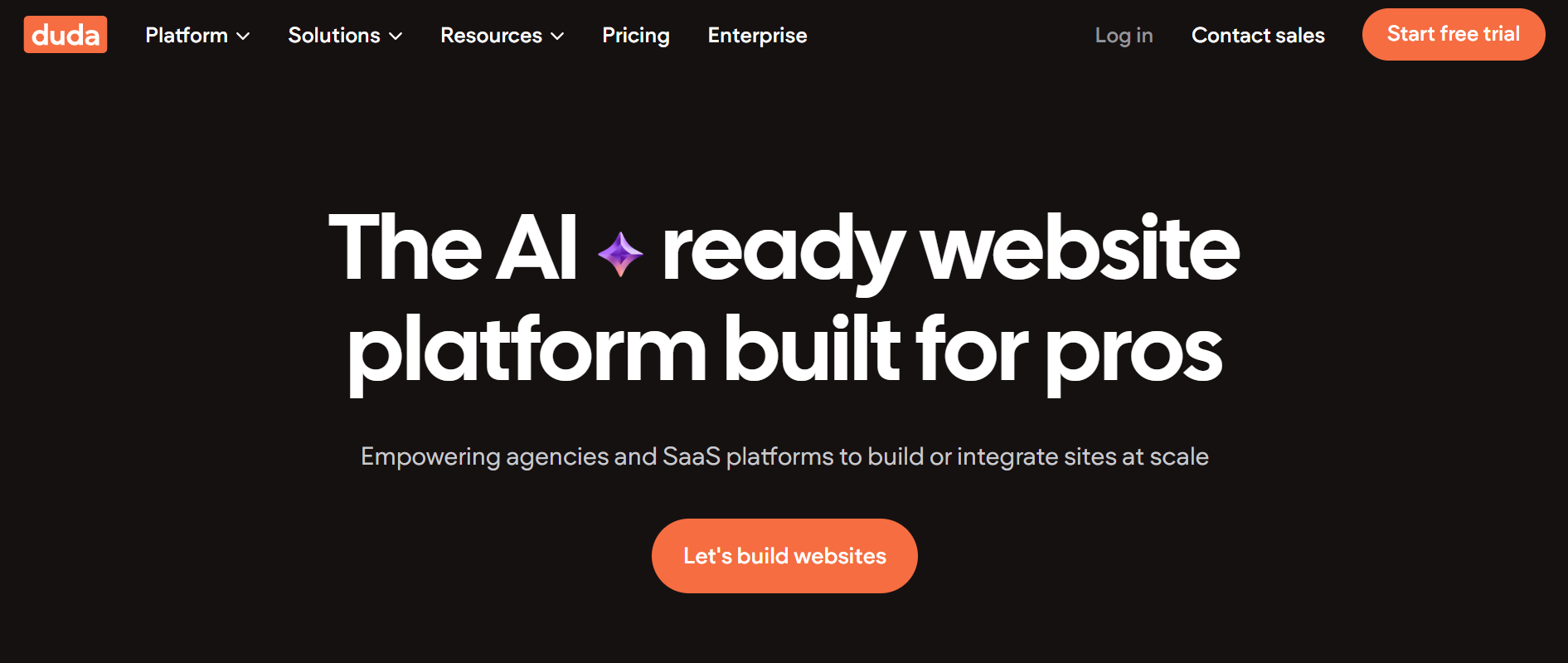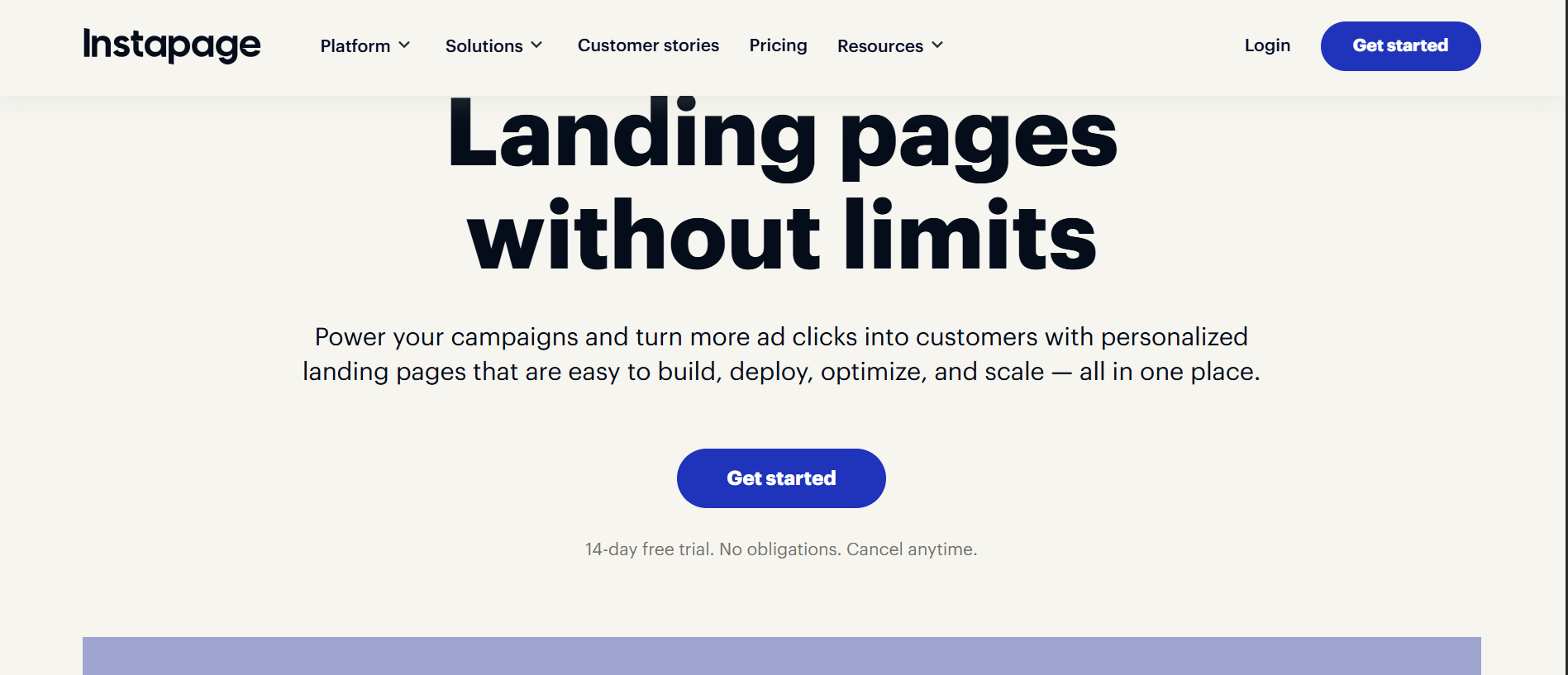If you’re deciding between Duda and Instapage, the choice really comes down to what you’re building — a full website or high-converting landing pages.

Duda is a website builder built for speed and simplicity. You can create responsive websites using its drag-and-drop editor, no coding needed. It offers pre-designed templates, e-commerce tools, and even lets you manage client sites in one place, great if you’re juggling multiple projects. Everything’s designed to work smoothly across desktop, tablet, and mobile.
Instapage, on the other hand, is focused on conversion-driven landing pages. It’s not meant to build full websites, but it shines when it comes to launching targeted campaigns. With personalization features, A/B testing, and deep analytics, Instapage helps you turn ad clicks into leads. Plus, its Instablocks feature lets you scale pages faster without rebuilding from scratch.
Both tools are powerful, but for very different use cases.
Feature Comparison: Duda vs Instapage
1. Design & Templates
Both Duda and Instapage come with user-friendly drag-and-drop editors and customizable templates, making it easy for anyone to create professional-looking pages without coding.
Imagine you’re a small business owner who needs to quickly launch a website or landing page, both platforms let you start with a clean design and then tweak colors, fonts, and layouts to match your brand. This ease of use makes them great for beginners or busy marketers who want to get online fast.
2. Mobile Editing
When it comes to mobile editing, Duda offers a useful edge. Picture this: You’re traveling or away from your computer and realize you need to update your website with a last-minute change, maybe fixing a typo or updating your contact info.
With Duda’s mobile editing capabilities, you can hop on your phone, make essential edits, and republish your site without hassle. Instapage doesn’t have this feature, so if mobile access and quick on-the-go edits are important to you, Duda stands out.
3. A/B Testing & Analytics
For marketers focused on improving campaign performance, Instapage’s A/B testing and analytics tools are a game changer. Imagine you’re running a Facebook ad campaign and want to test two different headlines or images to see which drives more sign-ups.
Instapage lets you easily set up A/B tests, track user interactions with heatmaps, and connect results to Google Analytics for deeper insights. This data-driven approach helps you optimize your landing pages and get the best return on ad spend.
4. Integrations
When integrating your landing pages or websites with other tools, Instapage shines with its extensive ecosystem. It supports over 120 integrations with popular advertising platforms, CRMs like Salesforce and HubSpot, email marketing tools, and e-commerce solutions.
Say you want to automatically add new leads to your CRM or send a thank-you email after a form submission — Instapage can handle this seamlessly. Duda supports integrations too but with fewer options, so if you rely on a complex marketing stack, Instapage is likely the better fit.
In short, if you want advanced marketing features and tight integration options, Instapage is designed for that. But if you’re looking to build and manage full websites — especially with some handy mobile editing — Duda still holds strong.
Related Article: Is Duda the Best Website Builder for Agencies & Freelancers?
Pricing & Trial Options
Duda starts at $25/month for basic plan, which makes it a pretty affordable option for freelancers, small teams, or agencies just getting started. You also get a 14-day free trial, no credit card required, so you can test it out without any pressure.
- Team plan- $39/ month
- Agency plan – $69/ month
- White Label – $199/month
- Custom plan
Sign up to start using the tools
Visit Duda Pricing Page for more details
Instapage, on the other hand, starts at a much higher $99/month. It’s clearly built for serious marketers or larger businesses focused on landing page performance. The 14-day trial is available too, but heads-up, you’ll need to enter your payment info to get started.
- Create Plan – $99/month
- Optimize plan – $199/month
- Convert plan – Custom pricing
Visit Instapage Pricing for more details
If you’re on a budget or building full websites, Duda offers more value out of the gate.
But if your main goal is converting traffic with high-performance landing pages, Instapage may justify the price, if you’re ready to invest. Sign up to start using the tools
Pros and Cons
| Duda Pros | Instapage Pros |
|
|
| Duda Cons | Instapage Pros |
|
|
Customer review
“Easy-to-use drag-and-drop functionality, making the design process efficient even for those with limited technical skills. The platform is also highly responsive, ensuring sites look great on both desktop and mobile”.
Sam L on G2 says Instapage is a reliable and user-friendly landing page builder”
What do you like best about Instapage?
Easy to use with zero technical knowledge or background. Enough features to build attractive and modern landing pages that look like native pages to your website. Templates make it very easy for new marketers or those not experienced with designing and building web pages.

When to Choose Duda or Instapage
Choose Duda if you need a cost-effective website builder that’s easy to use and gives you solid features like e-commerce tools, responsive design, and simple site management — without the high price tag.
Choose Instapage if your focus is on creating high-converting landing pages and running data-driven campaigns. With its advanced analytics, personalization options, and deep integrations, it’s perfect for marketers who want results and are ready to invest in them.
Related Article: Instapage Review: The Best Landing Page Builder for Marketers?
Final Verdict: Which Platform Fits Your Needs?
Choosing between Duda and Instapage comes down to what you really need.
If you want a full website builder that’s affordable and easy to use, with e-commerce features and responsive design, then Duda is worth it. It’s perfect for freelancers, small businesses, or agencies who want to launch and manage multiple sites smoothly.
But if your main goal is building high-converting landing pages backed by advanced analytics and personalization tools, then Instapage is the stronger choice. It’s designed for marketers and teams focused on boosting conversions and scaling campaigns, even if it comes with a higher price tag.
At the end of the day, both platforms are solid, it’s all about matching their strengths to your goals.